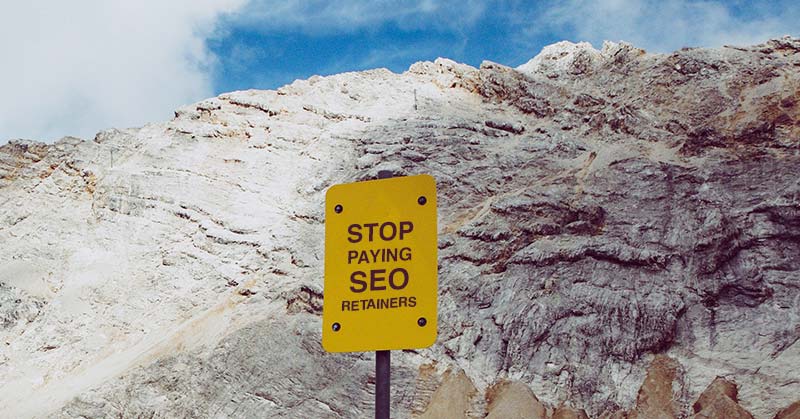(…And the only 3 SEO tasks you need to get SEO runs on the board)
Over the years, I’ve gained 15 years SEO experience: 7 years as a client of ‘SEO companies’ (when I was running my own non-marketing related businesses), 5 years doing the SEO myself (for my own businesses), and 3 years doing it for other people’s businesses.
I’ve worked with multiple SEO companies and been taken along for the ride. I’ve seen it all and I can tell you one thing for free, “you shouldn’t pay anybody a monthly fee for doing SEO”.
That’s right! I know this may be controversial for some SEO marketers out there, but the simple fact is you can no longer fool Google! There are a few simple rules you should follow to effectively get your SEO on track, and the rest is up to you the business owner, to run a really good business. That is going to help your SEO better than any SEO project being pitched by your SEO company, guaranteed!
But first, here’s why you need to reconsider your SEO spend:
1. You don’t know what your SEO company is doing with your $1,500 each month!
If you’re like most of the prospective clients I speak to, you aren’t able to tell me exactly what your SEO company has been doing, and what exact results they have achieved.
And shame on you for not knowing!
Sorry to be blunt, but it’s your business and your money! You should know exactly what they’re achieving (if anything) because you need to know exactly what you are spending your money on.
But don’t feel alone! I did it, and so many others still do…
So why not ask them for a detailed list of tasks they have completed and the results they have achieved. I think you’ll be gobsmacked by their answer. And don’t settle for “We’ve been doing some directory submissions, or some backlinks, or writing some content”. Ask for specifics, exact tasks undertaken, completed and what the actual outcome was.
2. Ongoing SEO is a thing of the past
Gone are the days when you can pay an SEO company to continually do SEO work and you’d get results. Actually those days are long gone (like by 4 years!). Today the only thing you need to do is run a good ship – one that is better than your competitors and the results will follow.
Google’s objective is to “To organise the world’s information and make it universally accessible and useful.” So its Google’s job to show what’s regarded as the most relevant, authoritative, informative, expert piece of content in relation to Google searches (i.e. what’s typed into the search box). And Google has become very good at this, evaluating the real world, and displaying results accordingly.
3. You can’t control Google
This concept of continually doing SEO is ridiculous. Whilst you can sometimes get some short term gains (and I repeat sometimes), by taking short cuts to fool Google into thinking you’re better than you are, it’s guaranteed to come back to bite you in the arse!
Google ranks websites based on how authoritative, relevant, expert and informative it perceives them to be based on a variety of factors outlined below. Any SEO work you undertake therefore should be focused on making you the most authoritative, expert, relevant and informative business in your field.
So what can you do…? We call it foundational SEO!
Building solid foundations is the ‘not-so-secret’ secret to all business success, and your SEO (or organic search results) are no different. It’s about getting all the building blocks in place so you can launch the growth of your digital marketing (and the new customers that come with it).
Why is common sense so uncommon!
And in this case, it’s all just common sense of doing the right things for your business. Not the nonsense that we see so often dished out by SEO companies.
3 simple tasks for great SEO Foundations!
1. A good website that Google can crawl and index
In order for Google to crawl and index your site, you need to have a few checks and balances in place on your website. A quick audit of your site will reveal:
How well can the search engines find and index your website?
- xml sitemap – a list all of the URLs for a website that are available for crawling
- Indexed pages – How many pages you have indexed in Google (i.e. the pages that google deems to have quality content
- www to non-www redirection – removes the risk of having two versions of your website and therefore risk that backlinks will point to two different locations
- robots.txt – a text file used to instruct web robots (typically search engine robots) how to crawl pages on their website.
How well can the search engines find and index each individual page?
This is how you tell search engines what content is on each page so they can index it correctly and show it in relevant search queries (the headings and descriptions that appear in a Google search). It includes things like ensuring title tags, meta descriptions and H1 tags are all updated in the backend of your website, in order to provide an insight into what the user will find on that particular website page.
How well visitors (and search engines ) can navigate your website?
So here is the thing to think about: If you are going to piss a visitor off when he comes to your site, your going to piss Google off!
- Your website navigation is what provides the journey that a visitor (and search engine) will take as they cruise around your site, and its important to have a good overarching user journey (the way you take the user from the home page to relevant sections of the website) and then within the site, the way you take me on a good journey to find out more about certain topics (this is called interlinking). As a user of your site if I’m not provided with a good user journey , I’m going to throw my hands up in frustration and go elsewhere. Guess what – so will Google!
- How quickly your website loads has a big impact on a user’s perception of your site (and business) and hence will affect your rankings – if your site takes 15 secs to load, you’re going to piss your target audience off, not to mention potential clients, and you’re going to piss Google off too!
- Mobile version – you get the point by now (don’t piss your users off!). You need a great mobile site that is quick, easy to navigate and provides excellent information. And this will be rewarded by Google!
2. Good web presence / digital branding
This is all about securing good listings of your business on the top 20-30 business directories (e.g. True Local, Hot Frog etc.) and industry specific directories. It also includes setting up Google maps, Apple maps and submission to other major search engines.
In addition to business directory listings, other ways in which you can get quality listings is to seek out opportunities to get content published on other websites, especially those that are highly regarded such as news or government websites including those ending in .gov and .edu), industry sites, or through authoring content on other websites with PR or blog content (alternatively have guest authors publish on your website in the hope that they also link from their site).
3. Clean up your backlinks
Yep that’s right, tell Google which websites you want to be associated with and which ones you don’t. You want more quality internal links that Google associates with. So you’ll be wanting to determine:
- How many good/bad backlinks do you have pointing to your website?
- What are customers and potential customers rating and saying about you online in customer reviews?
- How prominent is your social media presence and how engaged is your audience?
That’s it! 2-3 months’ work!
Follow these steps and it you’ll be done and dusted in 2-3 months. Nothing more, nothing less. It’s not rocket science. Get these done (and done well) and you’ve already won half the battle. This should see you get some good gains on the board in a relative short period of time.
What’s next?
What, other than running a really good business? There isn’t much from an SEO perspective that you can do, let alone need to do. We do however recommend that a quick SEO technical audit be revisited every 3 months – if you’re anything like me, you’ve experienced first-hand the ramifications technical issues cause when they arise out of the blue for no reason. So we just want to keep a close eye on it to make sure we are proactive in managing technology risks.
No really, what’s next?
Run a great business! That’s it, nothing more nothing less.
But what about creating content to improve SEO rankings?
Google has some good tools that tell you all the possible topics that your target audience is searching for. We use this to determine the 5-7 main topics/themes relevant to your business and then we need to make sure that we have great engaging content on each of them. This is the first step that will separate you from your competitors because very few business have done this well.
Incorporating a long-term content plan is also good way of developing content that is aligned with your overall marketing strategy. By this we mean content that compliments your overall marketing goals and objectives – not just ad-hoc pieces as opportunity arises. By preparing a plan in advance it saves time and ensures that content is published in a timely fashion with maximum exposure. It’s also works in your favour to continually update your website with fresh content – however it has to be relevant to your target audiences – not just random updates whenever you remember to do it!
But remember…
Don’t create content for the sake of creating content to ‘update or refresh’ your website, or because somebody told you to, or because you thought it was good for SEO.
And make sure any content comes from you
As someone who has been on all sides of the table, I know that you can’t outsource good content – this needs to come from the heart of your business! Google knows good content, and if somebody is producing content for the sake of SEO, particularly from an external source such as an SEO company, it’s likely Google will know it!
There you have it, run a great business and reap the rewards!
It’s simple, effective and it works every time. Google rewards great business and penalises those that try to circumvent the system for short term gains that results in long term pain!
So the question then becomes, what’s the secret to a great business?
And the answer is very simple actually. More complex to put into motion, but the concepts are very simple:
- A great website that impresses the bejesus out of your target audiences
- Great content that answers all the questions/provides all the info your target audience could possibly think of/look for (and an SEO company can’t produce this for you)
- Market your business better than your competitors
- Get social
- Nurture relationships, potential customers and leads
- Great sales and customer service (because this drives case studies and testimonials etc.)
- Repeat, repeat, repeat
- Win some awards, lead your industry!
I’ve got that Wowie feeling
Look it up! It’s a real word (well according to the internet anyway – if its online you know it’s true). Its definition is:
“An experience or object that the person feels is amazing, awe inspiring.”
If you can introduce a bit (or a lot) of wowie into your customer experience, you’re already winning.
At every touch point your business has with a potential customer / customer, ensure they walk away with that Wowie feeling each and every time.
When they 1st see your website: “Wow that website is awesome! It looks great, tons of information, easy to navigate around and I could tell they knew there shit!”
When the phone rings: “Wow – Carol really cared! She asked me lots of questions, really got to the bottom of what I needed and showed me what I’d get out of it.”
When I get an email: “Wow – great ideas in that email. It directly addresses the concerns I have in engaging a company like this and provides real value that I can implement tomorrow. And they were just trying to sell me something.”
When I see their Facebook post: “Wow what a great idea. I didn’t even know that sort of technology existed, I definitely have to check that out.”
When I pull my wallet out: “Wow – shut up and take my money. I simply have to have it.”
Post purchase: “Wow – those guys are good. Definitely the best service I’ve received in a long time. And they’ve called me a couple of times to make sure it’s all working as I expected and shown me a few tips that nobody else mentioned.”
Ready to get SEO savvy?
I hope I’ve convinced you to change your mind on your SEO retainer, and in doing so save you some money in the long run. You shouldn’t be paying an SEO company a retainer to do SEO, as ongoing SEO doesn’t work. Good SEO is based on building trust, credibility and authority with Google, and all you need to do to achieve this follow the 3 tasks to good SEO foundations to come out miles ahead of your competitors. Oh, and did I mention run a great business?
It’s that simple, nothing more and nothing less.
We’d love to give you a hand in running a great business…
Due North has a unique offering. When you work with us, you deal directly with our marketing superstars based in Melbourne and Brisbane. Our team provides broad marketing expertise across a range of disciplines for businesses in Australia and New Zealand, and are capable of both providing strategic advice and executing the plan. It’s a model we’re really proud of and produces some amazing results.






